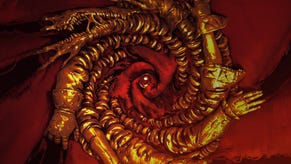Tengami: how paper and play gave life to the Wii U's indie darling - interview
Tengami is Nyamyam's papercraft puzzler set in ancient Japan, heading to Wii U, PC and Mac. VG247's Dave Cook speaks with ex-Rare dev Phil Tossell about how the team turned paper play-things into a compelling indie experience.
“In the beginning we were adamant that we wanted the game to strip back a lot of traditional conventions in videogames.”
Back at Sony's gamescom 2012 press event, Tearaway developer Media Molecule introduced us to its papercraft-fuelled romp with a simple elevator pitch: They asked the audience to consider a plain piece of paper and then imagine all of the things a person could do with it. You could draw a picture, fold it into a glider or scrunch it up into a ball and shoot some waste-basket hoops on your lunch break. The possibilities are limitless.
UK indie collective Nyamyam had a similar concept when it came up with Tengami; a point and click puzzler set in a papercraft rendition of ancient Japan. One glance at the studio's website reveals it to be a big fan of artistry, and strives to develop experiences that are fun and visually arresting. Tengami is both; using its neat paper dynamic to create taxing puzzles and gorgeously constructed environments. I had a chance to play it on Wii U last year and speak with studio co-founder Phil Tossell.
It's a deliberately slow experience that sees your hero strolling around a calming rendition of Japan. What's interesting - particularly in the Wii U edition - is the ability to use touch to fold and manipulate the scenery to create new paths and reveal secrets embedded within. One puzzle sees the player faced with a seemingly impassable waterfall, leading them to flip and scrunch its many segments to fashion a make-shift walkway. It almost melted my brain, but it's slow, passive entertainment that you can quite happily sit back and drink in at your leisure.
"There's two major influences to the game," Tossell told me. "There's the pop-up side of it and then there's the Japanese aesthetic. The pop-up came from when we were kids; a lot of children enjoy playing with pop-up books, and there's that kind of tactility to it, that amazing feeling of how something can be flat and three dimensional at the same time. You try to figure out, 'How does that actually work.' We thought that would be a good match for touch input, and so that's what we're trying to do; recreate that feeling."
In my humble opinion, they've nailed it. Flipping between scenes - say, from a pagoda to a rocky seaside path - reveals intricate paper mechanisms that are modelled on real-life creations. Much of what you see in Tengami has been created with actual paper and tested beforehand, just to ensure that it's all tangible and correct. It's a lot of work for a studio consisting of just three people. Tossell revealed that he and his colleagues decision to leave Rare and found Nyamyam due to how impersonal mainstream development was becoming, making this a truly personal project
Regardless of size, Nyamyam has worked solidly on Tengami for over a year now and it's really starting to take shape. Nintendo spotted an early version of it at Indiecade 2012 and later approached Tossell to sign it for the Wii U eShop. He feels it's a good fit, given the touch nature of the console's GamePad controller. "It's been a continual learning process," Tossell said of the game's mechanics. "A lot of that is to do with figuring out how you actually make pop-ups, and what does a game involving pop-ups actually look like? We settled on this relaxing adventure, but we're still learning."
"In the beginning we were adamant that we wanted the game to strip back a lot of traditional conventions in videogames," he added. "We didn't want lots of UI, we didn't want lots of talking characters - and it's not that there's anything wrong with those - but we wanted to try something that's much more stripped back, more about the experience and the atmosphere, that sets up what you can get just by playing and interacting with these pop-ups. The music plays a really important part in losing the player in the atmosphere."
Tossell's not wrong; the music really does reinforce Tengami's Japanese vibe, and there is very little in the way of on-screen clutter. In fact, every puzzle I played offered me absolutely no lead-in. All I could do was poke and prod the world to see what I could fold, crumble, flip and re-arrange before working out what was being asked of me. In this age of being led by blatant sign-posting and chasing obvious breadcrumb trails, it was a welcome change of pace. This interactivity didn't come easy however, as Tossell explained.
"Our artist is actually Japanese," he said, "so that helped us get an authentic style and it's all based on traditional Japanese hand-made papers. [co-founder Jennifer Schneidereit] lived in Japan for four years and I've got a great love of Japanese culture. I've been there many times. We wanted it to be authentic so we did a lot of research on the settings, environments, and the buildings, which were based on real Japanese structures. The first six months of the project was spent making pop-ups; trying to figure out how this kind of stuff works.
"Then I had to translate that into our tool-kits so we could make these pop-ups easily. You can actually make the pop-ups in the game. I actually met a pop-up artist at Rezzed 2013 who said, 'You're game's so cool, I'd love to make some scenes from [it].' So she went away and made three sets from the game that we showed at PAX. You get people who look at them and then look at the game and say, 'Oh my god it's exactly the same thing.'"
The process of making physical pop-ups to then transfer them into Tengami's code may sound either laborious or an necessary practice, but when you see these colourful dioramas contracting and transforming in front of your eyes you'll likely be thankful for the amount of work gone into making every scene feel as vibrant as possible. This is not a twitch gaming experience by any means, but sometimes you do just want a break from the explosions, expletives and blood spatters shoved down our throats by the mainstream pack.
Tengami offers an antidote to the blockbuster noise, and it could just prove to be one of the indie scene's most interesting propositions once it launches.
Let us know what you think of it so far below.
Tengami is in development for Wii U, PC and Mac. You can pre-order it for $10 here.











